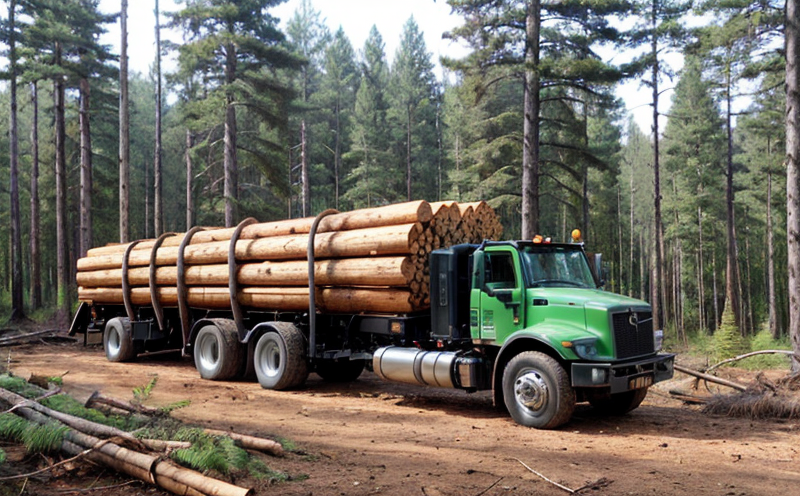Timber Hardness (Janka Test)
The Janka hardness test is a standardized method used to measure the resistance of wood to indentation caused by a standard steel wedge. This test is particularly valuable in forestry products testing, where it helps determine the suitability of different timber species for various applications such as flooring, furniture, and structural components.
In the agriculture and forestry sector, the choice of timber hardness directly impacts product performance and durability under specific environmental conditions. For instance, harder timbers like teak or oak are preferred in high-wear areas due to their resistance against abrasion and pressure, whereas softer timbers may be more suitable for decorative purposes where appearance is prioritized over strength.
The Janka test involves pressing a steel wedge into the wood until it penetrates halfway through its thickness. The force required to achieve this indentation is measured in pounds-force (lbf) or newtons (N). This measurement provides an accurate assessment of the timber's density and structural integrity, which are crucial factors for quality assurance.
Proper specimen preparation is essential for obtaining reliable results. Specimens should be cut from sound wood free from defects such as knots, cracks, or rot. Each sample must have a uniform cross-section with a diameter between 25 mm to 30 mm and a length of at least 100 mm. It’s important that the specimens are conditioned in a controlled environment prior to testing to ensure they are at equilibrium moisture content.
The Janka hardness test is widely recognized by international standards, including ISO 6874, ASTM D143, and EN 325. These standards provide detailed protocols for specimen preparation, testing procedures, data interpretation, and reporting requirements. Compliance with these standards ensures consistency across different laboratories and enhances the credibility of the results.
Understanding the Janka hardness value helps manufacturers make informed decisions about selecting appropriate timber species for their products. For example, a manufacturer specializing in outdoor furniture might choose harder timbers like mahogany or bamboo to ensure longevity under harsh weather conditions. Conversely, an interior designer may opt for softer timbers such as pine or birch for aesthetic reasons without compromising on quality.
Accurate Janka hardness testing is not only beneficial for manufacturers but also critical for regulatory compliance and consumer safety. Regulatory bodies often set minimum hardness requirements to prevent the use of substandard materials that could lead to product failure or injury. By adhering to these standards, laboratories ensure they deliver reliable and trustworthy test results.
The Janka hardness test plays a pivotal role in the forestry products testing process by providing quantitative data on timber strength. This information is invaluable for both research and development teams looking to innovate new products and for procurement officers seeking high-quality raw materials.
Why It Matters
The Janka hardness test matters because it provides a precise measure of the mechanical properties of wood, which are essential for evaluating its suitability for various applications. Harder timbers offer greater resistance to wear and tear, making them ideal for high-stress environments where durability is critical.
- Enhances product longevity
- Safeguards against material failure
- Aids in compliance with industry standards
- Supports informed decision-making by stakeholders
- Ensures consumer safety and satisfaction
In addition to these benefits, the test also contributes to sustainable forestry practices by promoting the use of appropriate timber species for specific applications. This ensures that resources are utilized efficiently without compromising on quality.
Benefits
- Precise Measurement: The Janka hardness test provides a quantifiable measure of wood density, allowing manufacturers to select the most suitable timber species for their products.
- Consistent Results: Compliance with international standards ensures that results are consistent across different laboratories, enhancing reliability and trustworthiness.
- Durability Assurance: Harder timbers tested using this method offer greater resistance to wear, making them ideal for high-stress applications like flooring and furniture.
- Regulatory Compliance: The test supports compliance with industry standards, ensuring that products meet safety and quality requirements.
- Informed Decision-Making: Accurate Janka hardness data helps stakeholders make informed decisions about the selection of timber species for various applications.
The precision and reliability of this testing method contribute significantly to product performance and customer satisfaction, making it an indispensable tool in forestry products testing.
Competitive Advantage and Market Impact
- Innovation Hub: By offering Janka hardness testing services, laboratories can position themselves as innovation hubs that support the development of new wood-based products. This capability attracts clients looking for cutting-edge solutions.
- Differentiation: Providing accurate and reliable test results allows laboratories to differentiate themselves in a competitive market by delivering superior service quality.
- Market Leader: Compliance with international standards positions laboratories as trusted partners, enabling them to become market leaders in forestry products testing.
- Sustainable Practice: By promoting the use of appropriate timber species based on Janka hardness data, laboratories contribute to sustainable forestry practices, enhancing their reputation and market standing.
The ability to deliver accurate Janka hardness test results not only enhances a laboratory’s competitive edge but also fosters long-term relationships with clients by ensuring consistent quality in the products they produce. This trust translates into increased business opportunities and a stronger market presence.





